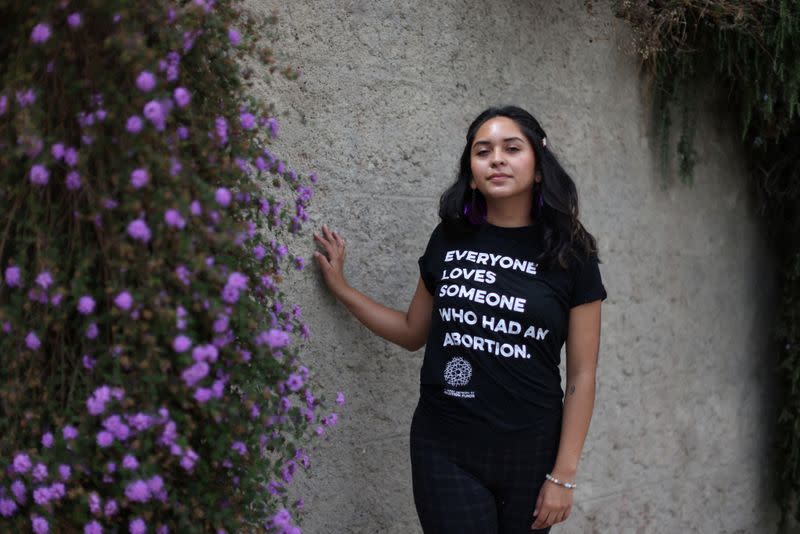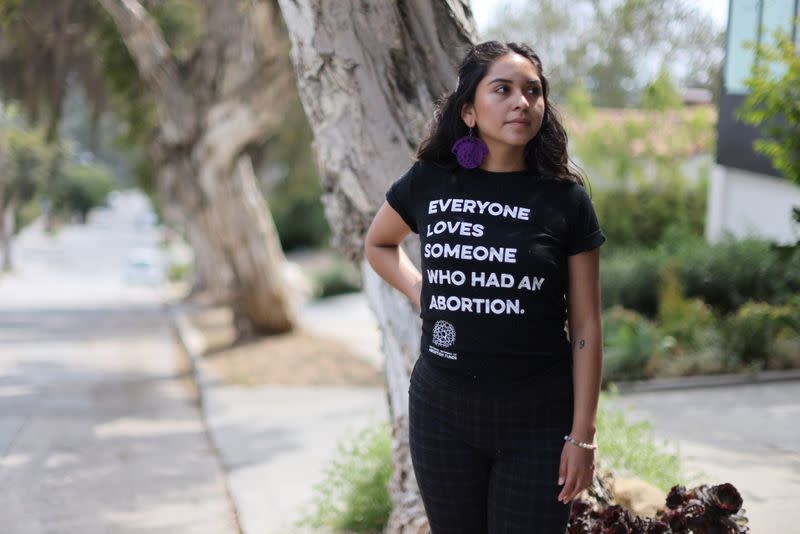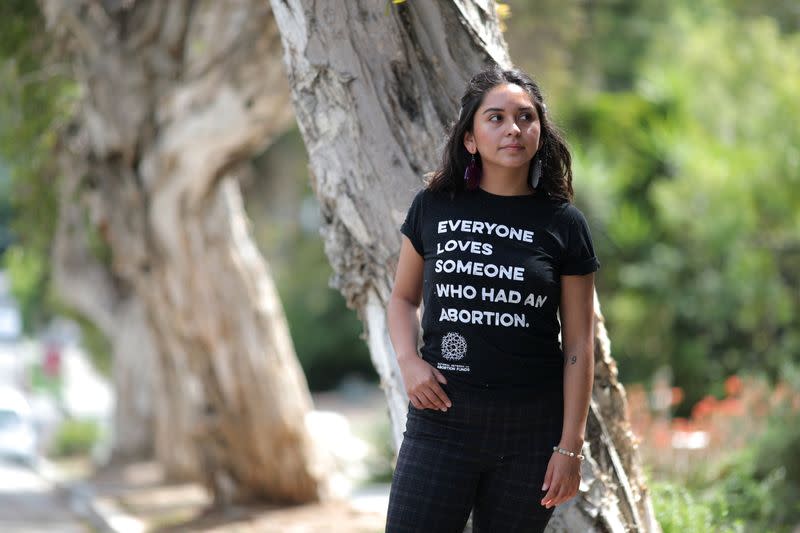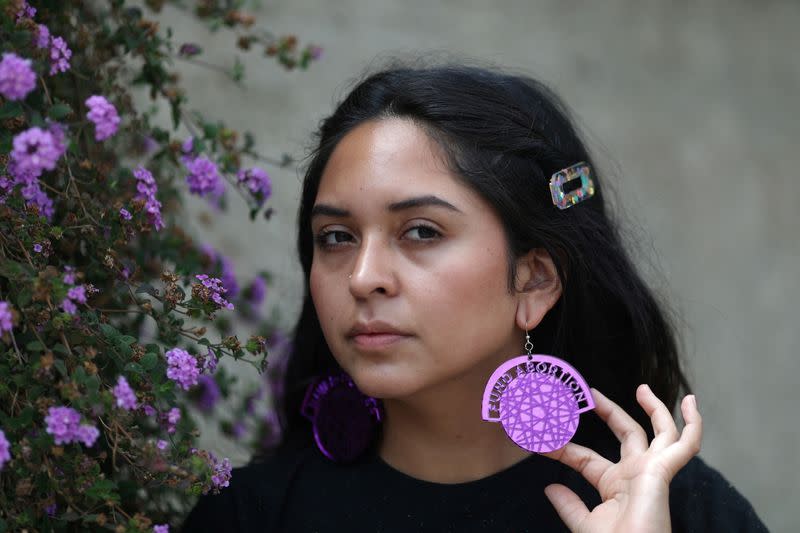Angst and apprehension for some women as U.S. Supreme Court revisits abortion
By Gabriella Borter and Andy Sullivan
(Reuters) - Jessy Rosales did not realize she was pregnant for weeks. When she found out, Rosales - a 20-year-old college student at the time - hid it from her family, whose judgment she feared, and struggled to find an abortion clinic that would accept her student health insurance.
The Los Angeles resident scrambled for more than a month in 2016 to save the $700 needed for the procedure and was failing her classes due to the stress. Rosales managed to end her pregnancy at around 16 weeks.
Other women could lose that ability, depending on how the U.S. Supreme Court rules when it reviews the legality of a Republican-backed Mississippi law that would ban abortions after 15 weeks of pregnancy. The decision by the justices on Monday https://www.reuters.com/world/us/us-supreme-court-takes-up-case-that-could-limit-abortion-rights-2021-05-17 to take up the case worried some U.S. women, who for decades have had legal access to abortion thanks to the court's landmark 1973 Roe v. Wade ruling.
"Access is so complex. There's so much that goes beyond just knowing that you want to have an abortion and actually getting to that destination," said Rosales, 25.
Abortion rights advocates fear - and abortion opponents hope - that the court, with a 6-3 conservative majority https://www.reuters.com/world/us/supreme-court-jumps-into-us-culture-wars-with-abortion-gun-cases-2021-05-18, could use the case to permit more restrictive abortion laws, which Republican-led state legislatures have been pursuing for years.
Reuters/Ipsos polling last year found that 58% percent of U.S. voters said abortion should be legal in most instances, including 76% of Democrats and 40% of Republicans.
The Roe v. Wade ruling barred states from banning abortion before the viability of the fetus outside the womb, which is generally viewed by doctors as between 24 and 28 weeks. Mississippi's law would ban abortion much earlier than that.
Carol Tobias, president of the anti-abortion group National Right to Life, applauded the court for taking up the case.
"We know more today about the life of a child in the womb than we did 50 years ago. The medical advances made in our knowledge of unborn children and their care and treatment are astonishing," Tobias said. "Today, viability is not a characteristic of the baby but of how advanced our technology has become."
Abortion providers and rights advocates have said bans like Mississippi's overlook the myriad circumstances that lead women to delay abortions and would disproportionately affect minority and low-income women.
Access varies, with 43 U.S. states prohibiting abortions at some point in pregnancy, according to the Guttmacher Institute, a group that supports abortion rights. Mississippi, a state of 3 million people, has one abortion clinic. Some other similarly sized states have several.
'A PERFECT WORLD'
Dr. Anuj Khattar, a fellow with Physicians for Reproductive Health who performs abortions in Tennessee and Texas, said he sees patients who seek second trimester abortions for a number of reasons. Khattar, based in Tacoma, Washington, said some did not realize they were pregnant earlier, some were in a abusive relationship and could not escape their partner sooner, and some learned of serious fetal anomalies that would prevent the baby's survival.
"In a perfect world, I think patients would be able to access abortion care earlier," Khattar said. "However, we don't live in a perfect world."
Valerie Peterson, a 42-year-old education consultant in Las Vegas, said she was living in Texas and 15 weeks pregnant when she learned that her baby's brain was detached from the spinal cord and would not survive. Her doctor gave her three options: get an abortion, wait to miscarry or possibly deliver a stillborn.
She wanted an abortion and due to restrictions in Texas at the time had to fly to Florida to obtain one, facing anti-abortion protesters at the clinic's doors. The total costs amounted to $5,000, Peterson said.
"People need to understand that there are special circumstances," she said. "Regardless, they shouldn't be in our business."
The number of abortions reported to the U.S. Centers for Disease Control and Prevention has dropped in recent decades, to roughly 620,000 in 2018, the most recent figures. About 5 percent of U.S. abortions came after 16 weeks of pregnancy, Guttmacher Institute data from 2016 showed.
COST CONCERNS
The cost of an abortion, as well as related travel and accommodations, can be prohibitive. Access to second trimester abortions is already limited. In Oklahoma, for instance, a single clinic, called Trust Women in Oklahoma City, provides abortions past 18 weeks.
Julie Burkhart, the clinic's founder, said there is "definitely a correlation" between a woman's financial struggles and delays in getting an abortion.
"You have to know where to go, you have to know who to call, and then you have to be able to find the means by which to travel to a facility that will see you," Burkhart said.
Insurance coverage varies widely. Most states do not cover abortions under the Medicaid healthcare program for the poor. Around half of women who get an abortion pay out of pocket, Guttmacher Institute data from 2014 showed.
Briana M., a Dallas woman who spoke on condition that her last name be abbreviated, said she considered selling her laptop, one of her only valuable possessions, to pay for her abortion of twins as a 20-year-old college student in Georgia.
She eventually obtained funding through a clinic and had an abortion at 22 weeks. Without it, she said she would have dropped out of school and not have gone on to earn her master's degree in social work.
"There are multiple barriers that people have to go through, and you can't put a time stamp on that," she said.
(Reporting by Gabriella Borter and Andy Sullivan; Editing by Scott Malone and Will Dunham)

 Yahoo Movies
Yahoo Movies 



